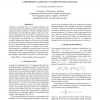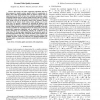16 search results - page 1 / 4 » Compressive Sampling Vs. Conventional Imaging |
ICIP
2006
IEEE
13 years 11 months ago
2006
IEEE
Compressive sampling (CS), or “Compressed Sensing,” has recently generated a tremendous amount of excitement in the image processing community. CS involves taking a relatively...
ICIP
2008
IEEE
14 years 7 months ago
2008
IEEE
Previous compressive sensing papers have considered the example of recovering an image with sparse gradient from a surprisingly small number of samples of its Fourier transform. T...
TMM
2002
13 years 5 months ago
2002
Most image and video compression algorithms that have been proposed to improve picture quality relative to compression efficiency have either been designed based on objective crite...
IEEECGIV
2009
IEEE
14 years 12 hour ago
2009
IEEE
The theory of compressive sampling involves making random linear projections of a signal. Provided signal is sparse in some basis, small number of such measurements preserves the ...
CORR
2011
Springer
13 years 11 days ago
2011
Springer
Compressive sensing (CS) exploits the sparsity present in many common signals to reduce the number of measurements needed for digital acquisition. With this reduction would come, ...


